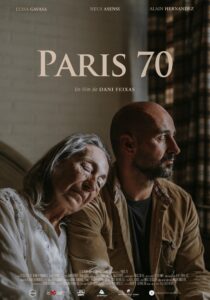Despite us being familiar with stories revolving around sickness and dying, each story has a unique angle. Depending on the relationship between someone suffering and someone caring, a narrative can be guided by emotions leading up to the time to say goodbye. Thar’s what makes Dani Feixas-Roka’s Paris 70 so gently original and welcome in the Live Action Short Film race. Its heart is determined but tender.
**This interview contains spoilers for Paris 70.**
A child is a natural caregiver for a parent as they are ailing with sickness or they are approaching death. They took care of us, so why shouldn’t we take care of them? What surprised me most about Feixas-Roka’s film, however, was how much it gives weight to the person who is providing care and not just to the person who is bedridden. It signal at a respect not often found in these stories.
“I wanted to make the caregiver the focus of the story instead of the patient, especially based on my experience,” Feixas-Roka says. “That resonated a lot into the heathcare channels that were able to project the film. It’s something that surprised me how welcoming they were and the impact it had, because, at the end of the day, no one asks how the careers feel. It’s always the perspective of the patient. I wanted to dedicate the film to my mom who took care of my grandmother for many years, and that’s what inspired the film in the first place.”
Jan cares for his mother, Angela, who is falling deeper and deeper into her Alzheimer’s. Every day, Jan crushes Angela’s pills, prepares her food, and serves her breakfast before she asks where her husband, Jan’s father is up to today. Just like he takes care of her medicine, Jan wants to honor the truth and he tells his mother that he no longer with them. Does that sadness affect her mood over and over again? Jan then tells a little white lie by saying his father is traveling, and it sends jolt of happiness through Angela as it changes the entire outlook on their days together.
Before Jan realizes what he can do, a traveling physician, Martha, asks him how he is doing. It’s a question that sets off the entire course of Jan and Angela’s time together for the remainder of the film.
 “Jan and Angela are the focus since they are so isolated in the house, but Martha gives her input,” he says. “When she realizes that Jan is suffering in addition to Angela, she’s not telling him what to do, but she’s inspiring him to try something that can help both Angela and Jan. If that conversation didn’t happen, the story could’ve been very dark, but I wanted to try something more magical and optimistic.”
“Jan and Angela are the focus since they are so isolated in the house, but Martha gives her input,” he says. “When she realizes that Jan is suffering in addition to Angela, she’s not telling him what to do, but she’s inspiring him to try something that can help both Angela and Jan. If that conversation didn’t happen, the story could’ve been very dark, but I wanted to try something more magical and optimistic.”
Paris 70‘s stars, Alain Hernández and Luisa [Gavasa] infuse their roles with a knowledgable weight so well that I assume that they knew one another. Feixas-Roka reveals that this is not the case, and they shared a real connection with one another on and off set.
“I was determined to have these two actors, and they didn’t know each other,” Feixas-Roka admits. “There was something inside me that knew that they were going to work well together. As we started rehearsal and started filming, Luisa [Gavasa] and Alain [Hernández] were exploring different places to go. Even when they weren’t shooting, Alain and Luisa would be holding hands, so they were playing together like if they were mother and son. I think that closeness helped to take the chemistry to the next level.”
At the end of the film, Jan and Angela share a moment of clarity. It’s an intimate realization between mother and son and the games that we play. It’s almost as if Angela is catching her son trying to play a trick on her. Feixas-Roka gives permission for the audience to feel this childlike innocence blended with a parent’s permission and acceptance.
“That ending is actually based on something that’s under medical investigation known as ‘terminal lucity,'” Feixas-Roka says. “They find that there is a moment of clarity before someone dies. She tells him that this little white lie isn’t a lie because she knew what he was doing. They could have played the game together and it could’ve helped them enjoy their time together. Almost like the hunter has been hunted.
Alain’s father died less than a year ago, and it was difficult for him to stay in the moment, because it was so emotional. I felt like it was my job to help him keep calm and assist him to stay in the moment. The rest is the magic of editing. It’s one of those scenes that you can help guide in the editing room. There are key moments of silence that were tied with the emotion of the scene. I didn’t want to go into the dramatic part of the performance in the scene immediately, so there was a lot of control.”









